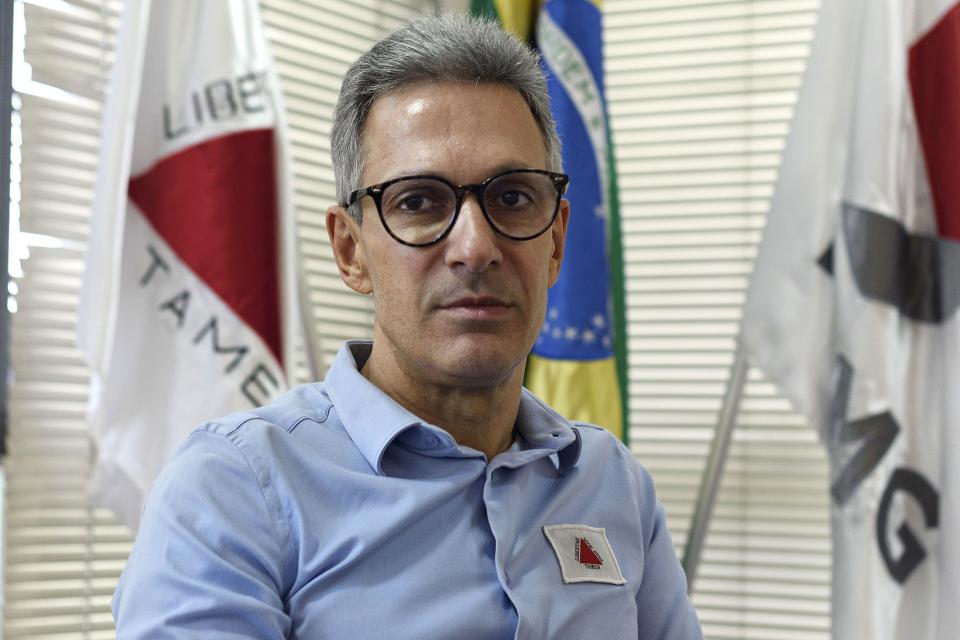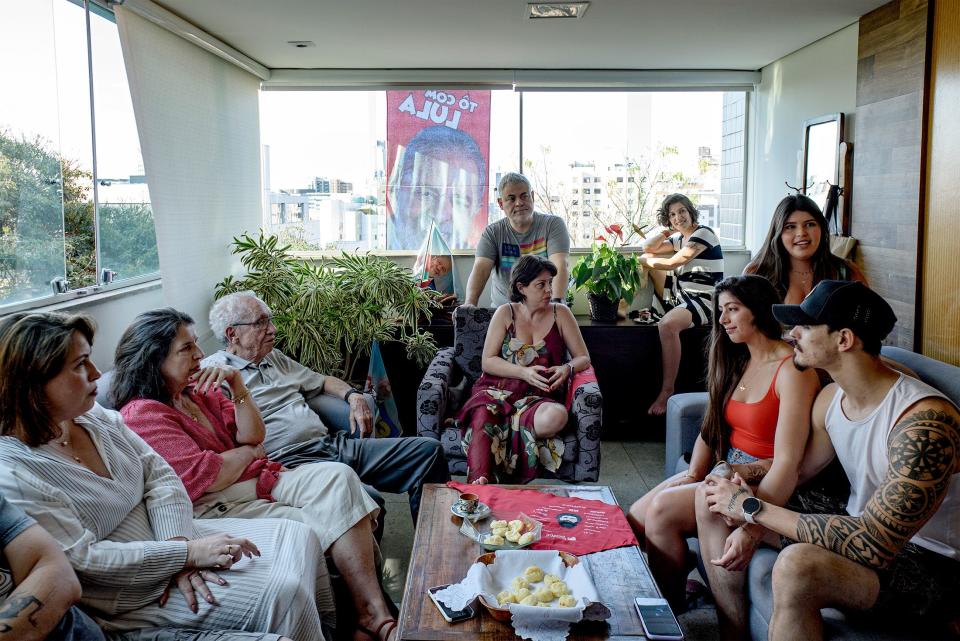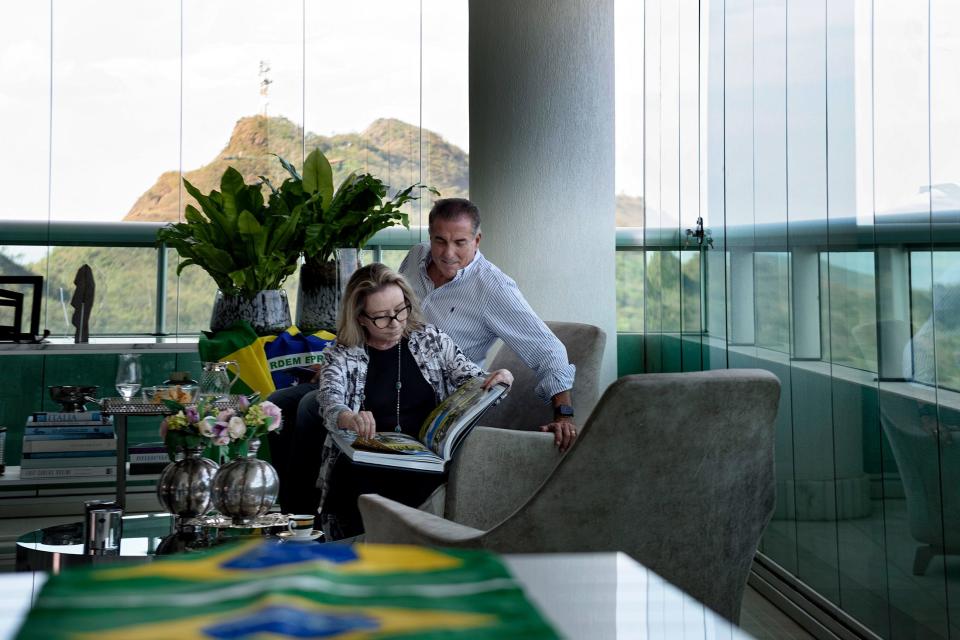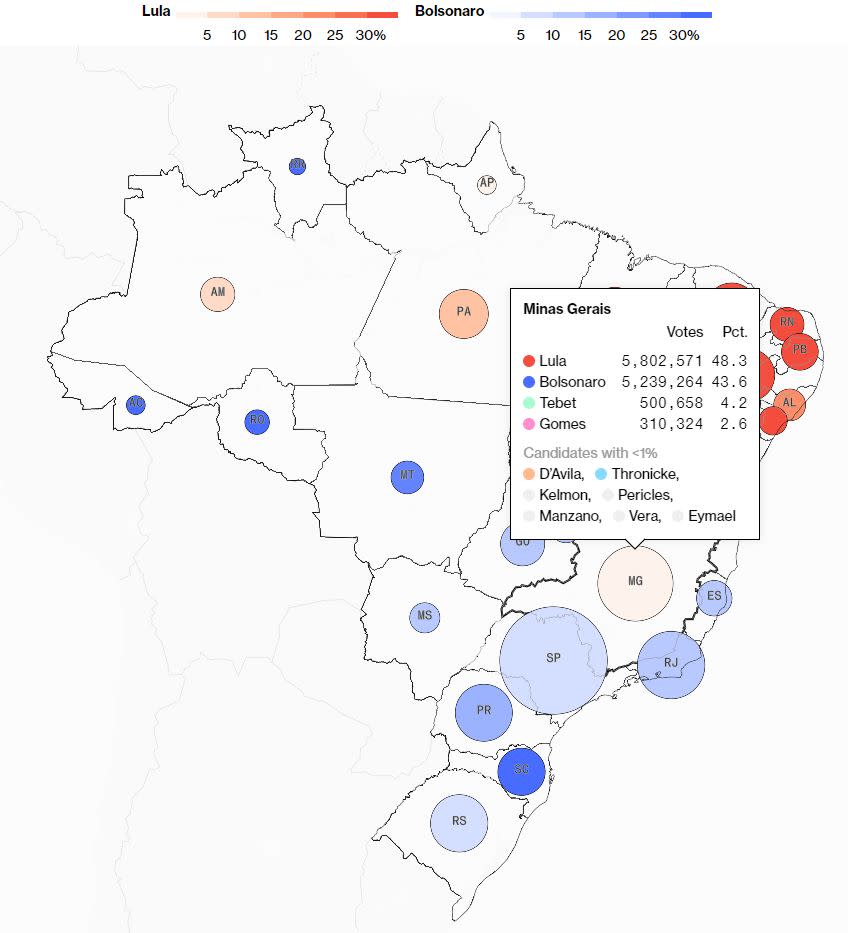As Bolsonaro Cuts Into Lula Lead, Battle for Key State Heats Up
- Oops!Something went wrong.Please try again later.
- Oops!Something went wrong.Please try again later.
(Bloomberg) -- Inside the top-floor apartment where Rosangela Cosenza gathers her brood on weekends and holidays in the central Brazilian city of Belo Horizonte, chatter and laughter flow across a large living room. With plates of the local cheese bread specialty, pao de queijo, and cups of dark rich coffee, three generations crowd onto sofas and armrests, talking over one another about family and friends.
Most Read from Bloomberg
Renters Hit Breaking Point in a Sudden Reversal for Landlords
China Stocks Slide as Leadership Overhaul Disappoints Traders
Korean Air Plane Overruns Runway While Landing in Philippines
Lately, it’s all politics all the time, as the country of 215 million prepares for a fateful election on Oct. 30 between President Jair Bolsonaro and his opponent, former President Luiz Inacio Lula da Silva. For Rosangela, the choice couldn’t be clearer: "The only situation in which I would stop talking to a family member is if they voted for Bolsonaro."
A few miles away, at the lavish and well-secured apartment of Sergio and Maria Helena Botrel, with a panoramic view of the city, the talk is also of politics. There, the concern is Lula, who's viewed as a corrupt firebrand of the left who must be kept out of office at all cost. “He would be a disaster,” Sergio says.
The city where the two families live is the capital of Minas Gerais, a must-have state in Brazil’s elections. Since the return of democracy four decades ago, no candidate has lost Minas and won the presidency. It's where marketers and pollsters -- and candidates -- spend their time. Hundreds of miles north of Rio de Janeiro and Sao Paulo and as big as Spain, it splits Brazil down the middle. The north is poor and embraces Lula for his social welfare programs. The south and west are home to large miners and metal producers, Bolsonaro strongholds.
Most striking is the fear of the other. Nearly half of voters are more concerned with keeping the other candidate out than bringing theirs in, according to Felipe Nunes, head of pollster Quaest, based in Belo Horizonte.
At a recent holiday gathering at the pro-Lula Cosenza home, where a flag with his portrait hangs, Rosengela, a 70-year-old retired social worker, her husband, a physician, her three daughters, their spouses and kids couldn't stop expressing repulsion for Bolsonaro.
"He's racist, homophobic and misogynist," insisted granddaughter Maria Eduarda, a 19-year-old law student. She’s been working on her classmates, many of them Bolsonaristas, and is proud to say that she flipped at least one vote by focusing not on ideology but personal and systemic integrity. "This election is not about supporting left or right,” she’s been telling her fellow students. “It's about character and democracy."
Her mother, Rafaela, put the issue succinctly: “ I will vote for anyone who is not Bolsonaro.”
The Botrel home, which draped its walls in Brazilian flags for the first round earlier this month and dressed in the yellow shirt of the national soccer team — it has become a Bolsonaro supporter’s uniform -- takes a markedly different view.
"Brazil had to break a corruption scheme,” said Botrel, 71, an engineer who sold his building company. “Bolsonaro was the man to do that. He’s not a sophisticated person and speaks rudely. But he represents family and religion, and I agree with that. Lula has retrograde ideas. He wants the state to solve all the nation’s problems."
The betting in Minas leans slightly toward Lula who, in the first round this month, took 48% of the vote to Bolsonaro’s 43% both in the state and in the country. The race has tightened, though, with the state’s latest polls showing more like 50-48 for Lula. And Lula’s loss in the first round on his home turf of Sao Paulo has his campaign doing an urgent reboot.
Pollster Nunes said that the reason everyone is focused on the state is that “everything from soap, shampoo and lotions to music is tested in Minas first,” because it is such a microcosm of the continent-sized nation.
It is also the state where Bolsonaro 67, was stabbed by a mentally unstable man at a campaign event four years ago. Bolsonaro, a former army captain and pro-gun free-market advocate, nearly died before going on to win big.
Today Bolsonaro isn’t riding as high. He’s made a name for himself internationally by dismissing scientific consensus on Covid-19 — he refused to get vaccinated and rarely masked when wading into a crowd — and on the environment, especially his policies that have increased deforestation of the Amazon.
He has attacked the judiciary, the academy and the media in a manner modeled on his friend Donald Trump. And like Trump, he has asserted that if he loses, it will be due to trickery and rigged voting machines, not popular will.
Lula, 76, favors land and income redistribution to fight inequality and says he will work to preserve the environment. He doesn’t question the integrity of the electoral system. But he spent a year and a half in prison for the role he and his Workers’ Party played in a massive corruption scandal known as Carwash. And while his conviction was overturned, many still view him as unscrupulous.
As Botrel put it, "There probably is corruption in this government, but nothing compares to what we saw in leftist governments. I think it is absurd that Lula is running for president."
Electoral politics in Minas also manifest a split between local and national concerns. The state just re-elected Governor Romeu Zema, a wealthy businessman and political newcomer supported by Bolsonaro.
His campaign projected the image of a humble workaday fellow putting his house in order after an unpopular tenure by a former Workers’ Party governor.
Aided by big transfers from the federal government at the height of Covid-19, Zema paid delayed wages to public servants, reduced public spending and resumed the transfers of the state’s tax collection to cities.
During the pandemic, as Bolsonaro attacked vaccines, Zema stayed away from the president and did so again during the first part of this campaign when Bolsonaro polled poorly. But the president did better than expected in the first round and now that Zema has won, he publicly embraces him again.
“My job is to tell Minas Gerais that a liberal government will be much better for Brazil than the past disaster of the Workers Party,” he told Bloomberg in an interview in his Belo Horizonte office, wearing his usual work outfit -- a shirt with the state flag on his chest.
Zema acknowledged that Lula is ahead and said he’s been trying to explain to Bolsonaro that Mineiros don’t like the aggressive speeches he often makes. Mineiros, he said, are suspicious and cautious: “If we were a country, we’d be Switzerland.”
For outsiders who remember Lula’s years in office from 2003 to 2010 as high-flying and ambitious, fueled by a commodity super-cycle, it’s surprising to hear that in Minas he’s considered the candidate of restraint and modesty.
That’s the view of Renato Meirelles, a behavior trend specialist. It’s natural, he said, for Mineiros to vote for a moderate and, in this election, Lula is that candidate.
Minas’ industrial sector is mostly on Bolsonaro’s side. The president’s economic policy was successful, says Flavio Roscoe, head of the Minas Gerais Industrial Federation. The country’s business environment improved and Minas Gerais’s industrial GDP surpassed the national level in 2021: 10% versus 4%, according to Roscoe, whose name has been mentioned as a potential industry minister if the president is reelected.
Roscoe said his federation has done a study showing Brazil could lose 5 million jobs and 5% of its GDP if Lula is able to do as he promises, reversing the current labor reform, ending the country’s spending cap rule and killing the privatization program.
In the pro-Lula Cosenza household, this is seen as the kind of smear that affected even some of them when Lula was convicted of corruption.
Marcela, 46, a lawyer and civil servant, is the most passionate on this score. She says she was deeply disappointed in 2005 when Lula’s political allies were accused of buying votes to get bills passed in congress. “I had a fight with my mom at that time and said I would never vote for Lula again,” she said. But there was no proof that Lula was directly involved, Marcela said, and after four years of Bolsonaro, it’s clear what the right side is.
The family says it feels isolated in its social circle because most of the people around them support Bolsonaro. They are members of Minas Tenis Clube, where Belo Horizonte high society gathers. Lately, the family has stayed away. “Too many Bolsonaristas,” Rafaela says.
Botrel, the engineer, who belongs to the club, will indeed vote for Bolsonaro but because that’s the only way to defeat the leftist Lula. Asked if he considers himself a Bolsonarista, he said no, he’s a Bolsonaro voter.
His wife Maria Helena, an interior designer, is more enthusiastic. She’s the one who decorated the apartment with Brazilian flags for the election’s first round and got everyone in the family to wear the yellow soccer shirt.
On a busy street in central Belo Horizonte, campaign swag for both candidates is prominently displayed in a shop called Tem de Tudo -- “we have everything.” Towels, T-shirts and hats from both candidates hang side-by-side. Simone Andrade, 48, is there to sell them, wearing a smile and a neutral purple T-shirt. When asked, she says her candidate is Bolsonaro because pandemic lockdowns, pushed by the Workers’ Party, were bad for business.
That said, Lula’s products are more in demand. During a 15-minute visit, only Lula souvenirs sold. Andrade says she has a sense which way the election is headed in Minas by what she sees in her shop. Some people don’t buy anything, she said, “They just come and kiss or slap the towels and move on.”
The kissing, she said, has been in Lula’s direction.
Most Read from Bloomberg Businessweek
What the Alzheimer’s Drug Breakthrough Means for Other Diseases
The Private Jet That Took 100 Russians Away From Putin’s War
Female Bosses Face a New Bias: Employees Refusing to Work Overtime
Europe’s Most Valuable Tech Company Tries to Avoid the Chip War
©2022 Bloomberg L.P.





